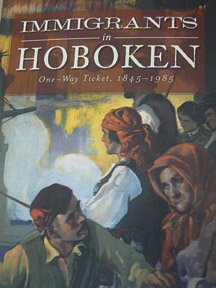Christina A. Ziegler-McPherson’s new history, “Immigrants in Hoboken – One-Way Ticket, 1845-1985” shares rich stories of Hoboken’s past, emphasizing the city’s importance as both a port of entry to the new world for immigrants, and as an embarkation point for soldiers going off to war.
After Ziegler-McPherson moved to Hoboken in 2005, she wanted to learn more about the city for a new book. The historian, who is originally from California, said last week that Hoboken offers a good case study of immigration.
“Many historians often do a case study about just one particular neighborhood in a city,” Ziegler-McPherson said last week. “But you can do that with all of Hoboken, because its size is very equivalent to one neighborhood.”
‘We have a rich history here that should be explored in a scholarly fashion.’ – Christina Ziegler-McPherson
____________
The data in the book outlines who came to live in Hoboken, when they did, and why.
“I used a lot of old newspaper articles; I used the census a great deal, and city directories from the Jersey City main library,” she said. “Before you had phone books, you had city directories. I also used the Hoboken Historical Museum, various memoirs, and a lot of information from the local library as well as church records. Those are the kinds of resources you’d use to write any social history that enables you to understand the ethnic makeup of the community.”
‘Heaven, Hell or Hoboken’
The book also details Hoboken’s significance during the two world wars. The city served as a major port of embarkation for thousands of soldiers.
Ziegler-McPherson also works as a volunteer with the Hoboken Historical Museum, where she presented an exhibit called “Heaven, Hell, or Hoboken,” named after a famous phrase used by soldiers who hoped to return soon, dead or alive, from World War 1.
“I think the war chapter is quite good,” she said. “I actually used the basis of that chapter to write the script for the ‘Heaven, Hell or Hoboken’ exhibit I did at the Historical Museum.” Chapter six profiles Hoboken from 1917-1919 during World War I.
Strong ethnic sentiments during that war caused a change in culture in Hoboken, which was largely a German city before World War I. The school system even utilized a bilingual program, with all students studying both English and German.
The city’s German-American culture disappeared thanks to anti-German sentiment during the war, Ziegler-McPherson says in the book.
“Most people spoke German, but that was just eliminated during the war,” she said. “The school district dropped German…there was a great deal of oppression, with about 1,000 people evicted from homes along the waterfront. Prominent Germans in Hoboken were arrested and interned at Ellis Island. It was a very difficult time for German citizens in Hoboken.”
She also outlines the rise of Italian-Americans in politics in Hoboken, which she said is mostly a consequence of the demographic makeup of the city after the war.
“Italian-Americans came into their own politically after the war and they in effect challenged the Irish-American power system that had been in place for about 100 years,” she said. “I think that first off it was a reflection of pure numbers; they were the largest ethnic group. Also it was the experience of World War II. Italian-Americans had become established. It was possible and logical for Italian-Americans to finally politically unify.”
Presentation at the Museum on July 17
Ziegler-McPherson began work on the book in 2007. She worked on the book while tending to other projects, and decided in 2009 that she wanted to finish the text.
“I did more research and I applied for a grant from the Center of Puerto Rican studies and did some oral history with Puerto Rican residents,” she said. “I interviewed about a dozen people. It enabled me to get the data to finish the last chapter about Puerto Rican migration.”
The book was released in late May, and is available through Amazon.com and The History Press, as well as at the Hoboken Historical Museum.
Ziegler-McPherson is a public historian who holds a PhD in History and has published several encyclopedia essays about immigration, according to a release. She teaches history at Empire State College, which is part of the State University of New York system. Ziegler-McPherson is also a guest curator at the Museum of the City of New York.
She will be at the Hoboken Historical Museum on Sunday, July 17 at 4 p.m. to speak about her book.
“I’ll give a short lecture and then we’ll open it up to the floor and have a discussion,” she said.
Ziegler-McPherson said she hopes to do more work about Hoboken.
“We have a rich history here that should be explored in a scholarly fashion,” she said. “I think it would be nice if people in the city were more interested in Hoboken’s history.”
Ray Smith may be reached at RSmith@hudsonreporter.com
